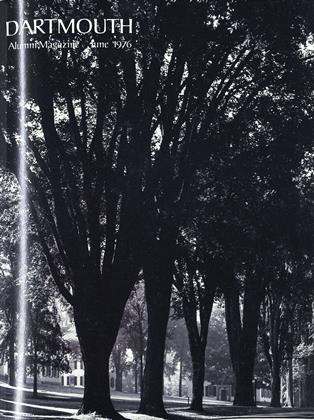One imagines that Daniel Webster might have felt particularly pleased by this installment of his papers. Certainly, it will be welcomed by those who study the politics and society of his era. In the volume at hand Webster's historical executor, Professor Charles M. Wiltse, displays a broad editorial prowess that attests to a career of distinguished achievement in the study of antebellum America. The period of private correspondence presently under review was one of rapid change in the nation's life as well as in Webster's. To present his letters as effectively as Wiltse has done here thus requires much more than painstaking concern for textual accuracy and proper footnoting. He has found it necessary to employ a sensitive biographical understanding and an imposing knowledge of national, state, and congressional politics during the 1820s.
As a consequence, this volume constitutes more than some well-annotated correspondence of varying significance which Webster wrote and received. Not always the case in letter collections, elements of thematic continuity suggest themselves easily as one works through the pages: Wiltse has not reserved space for the trivial, tangential, or obscure. Instead, and as a substitute for cumbersome footnotes, he includes extremely lucid general notes, paragraphs of several hundred words, which help the reader to place the letters in historical context. This feature, one can speculate, is one that would have drawn Webster's particular approval. As a man of ambition, flexibility and skill, he might take pride in a format which enables the reader to follow in detail his leaderahip in national politics.
Politics in the later 1820s certainly presented no fewer challenges to contemporaries like Webster than it has to historians. During John Quincy Adams' term as President from 1824 through 1828, Webster witnessed Americans busily jettisoning old institutions and customs - the closed nominating caucus, franchise restrictions, and privileged provincial elites gave way to mass political parties. Meantime the march of settlement westward, spreading networks of new roads and canals, the proliferation of newspapers, a nationwide wave of religious revivalism all announced a new era of expansion and interdependence, again at the expense of older ways. The times, it seemed, demanded new leaders, men with broad, cosmopolitan visions who could reconcile the rapid changes of the day with the need for political order. Webster clearly saw himself as just such a figure and began acting accordingly.
Assisted by Wiltse's explanatory notes, readers will find Webster's quest for national eminence a fascinating narrative. Slowly he terminated rural New Hampshire associations for the power centers of commercial Boston, aligning himself with factions which opposed the laissez faire ideology of Jacksonian democracy. Countering Jackson's emphasis on states' rights, free trade, and a strict construction of the Constitution, Webster espoused federal activism in the nation's affairs, Appealing, like the Jacksonians, to the "common man," Webster endorsed a high protective tariff (reversing an earlier stand), federal subsidies for road, canal, and harbor construction, and a powerful national bank. Though he was charged at the time (and has been since) with being a mouthpiece for selfish Northeastern commerce magnates, there was much more than narrow "interest" politics in Webster's championship of economic nationalism. He envisioned this broad program (the "American System," as Henry Clay termed it) as a vehicle for transcending the nation's regional variations while democratically promoting the well-being of all classes.
At the same time, Webster found it easy to reconcile national interest and personal ambition. The letters are filled with discussions of party maneuvers, legislative tactics, and electioneering. By sponsoring the "American System" Webster opened new areas into which he could extend his personal influence - government contracts, patronage appointments, and legislative logrolling. Here was the activity upon which so many political careers, Webster's included, now depended; here is also the kind of material which can prove the downfall of readers and editors. The content of such letters often takes on a form of oblique shorthand. The complicated references to pending legislation, committee assignments, parliamentary procedure, and campaign tactics could easily have left readers mired in confusion. But thanks to Wiltse's ever-useful notes, material of this kind becomes instead a fascinating historical introduction to the inner workings of those who directed mass politics. In this instance, as is the case throughout the volume, the significance of Webster's own career thus takes on a consistently greater clarity, as do the circumstances of his age. For these reasons, most of all, historians will appreciate Professor Wiltse's editorial talent and find this volume indispensable for understanding Daniel Webster and politics in the 1820s.
THE PAPERS OF DANIELWEBSTER: CORRESPONDENCEVOLUME II: 1825-1829Edited by Charles M. WiltseUniversity Press of New England(Hanover), 1976 563 pp. $20
Author of a 1970 biography of Joshua R. GiddingProfessor Stewart teaches history atMacalester College.
 View Full Issue
View Full Issue
More From This Issue
-
 Feature
FeatureA four-and -a-half-ounce magic totem pole
June 1976 By NORMAN MACLEAN -
 Feature
FeatureTHE OLD ROMAN SPEAKS TO US STILL
June 1976 By DAVID SHRIBMAN -
 Feature
Feature231 Years for Dartmouth
June 1976 -
 Feature
FeatureCommencement
June 1976 By JAMES L. FARLEY -
 Article
ArticleCollege with an Upper-case "C"
June 1976 -
 Class Notes
Class Notes1959
June 1976 By DOUGLAS WISE
Books
-
 Books
Books"Week-day Religious Education in America" is the title of a paper read before the Contemporary Club in Davenport, Iowa,
JUNE, 1928 -
 Books
BooksFaculty Publications
December 1935 -
 Books
BooksIsland Quest
JANUARY | FEBRUARY 2020 -
 Books
BooksTHE ANCESTRY OF THE LONGLIVED.
November 1934 By C.H. Forsyth -
 Books
BooksTHE BODY THAT WAS'T UNCLE
May 1939 By R. A. Burns -
 Books
BooksANALYTIC GEOMETRY.
December 1936 By Robin Robinson '24

